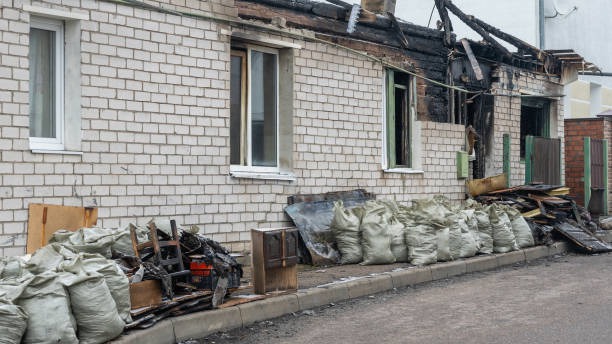Smoke damage can be a distressing problem following a fire. It’s not just about the visible soot but also the lingering odors that seem impossible to get rid of. The challenge lies in understanding how smoke penetrates materials and affects indoor air quality.
The Science of Smoke Odor
When a fire occurs, the smoke that fills the air consists of a mixture of particles and gases. These elements cling to walls, furniture, and flooring, leaving a persistent odor. The secret to eliminating it lies in addressing these particles at the microscopic level.
Health Concerns Linked to Smoke Odor
Lingering smoke odor is unpleasant but can also pose health risks. Breathing in residue can lead to respiratory issues, headaches, and allergic reactions. That’s why it’s crucial to tackle the problem promptly and effectively.
Initial Steps to Combat Smoke Odor
It’s tempting to dive into cleaning immediately, but taking some initial steps can make a big difference in your efforts to eliminate odor and improve air quality.
Ventilation is Key
The first thing you want to do is ventilate the area. Open windows and doors to allow fresh air to circulate. This helps dissipate the smoke particles and dilute the smell.
Remove Damaged Items
Items that are severely damaged and cannot be salvaged should be removed. Carpets, drapes, and certain pieces of furniture need to go. This reduces the amount of material retaining smoke odors.
Effective Cleaning Methods
Cleaning after smoke damage isn’t just about scrubbing surfaces. Specific methods can help to lift odor-causing particles more effectively.
Professional Cleaning Solutions
Consider professional-grade cleaners designed to neutralize smoke odors. These products break down the chemical compounds causing the smell, making them more effective than regular household cleaners.
DIY Cleaning Tips
If you prefer a DIY approach, you can use common household items like vinegar or baking soda. Vinegar is known for neutralizing odors, and placing bowls of it around the affected areas can be beneficial. Baking soda’s natural absorption properties make it ideal for sprinkling on carpets before vacuuming.
Using Vinegar
-
Fill bowls with white vinegar and place them around the room.
-
Wipe surfaces with a cloth soaked in vinegar to eliminate odors.
Baking Soda Method
-
Sprinkle baking soda on soft surfaces and let it sit for a few hours.
-
Vacuum the area to remove both the baking soda and absorbed odors.
Advanced Odor Removal Techniques
Sometimes, basic cleaning isn’t enough. When the smell lingers despite your efforts, advanced solutions offer a more powerful approach.
Using an Ozone Generator
Ozone generators can be highly effective in neutralizing stubborn smoke odors. They work by releasing ozone into the air, which reacts with odor molecules and neutralizes them. Always follow safety guidelines when using these devices.
Thermal Fogging
Thermal fogging involves a deodorizing solution being heated and sprayed in a fog form. This method reaches crevices that smoke may have penetrated, ensuring a thorough treatment.
Improving Indoor Air Quality
Cleaning up after smoke damage is only the first step. Ensuring your indoor air quality is improved and maintained is essential for a healthy living environment.
Using Air Purifiers
Investing in a high-quality air purifier can make a noticeable difference. These devices capture smoke particles and other pollutants, keeping your air clean and fresh.
Regular HVAC Maintenance
Your HVAC system plays a crucial role in circulating air throughout your home. To ensure it’s not spreading contaminated air, regularly change filters and consider professional cleaning.
The Importance of Professional Help
Though you can tackle a lot on your own, sometimes professional intervention is the best way to ensure thorough cleanup and restoration.
Hiring Professionals
Experts specializing in fire and smoke restoration in Ottawa can offer comprehensive services. They have the equipment and expertise to treat hard-to-reach areas and ensure your home is safe.
Mould Remediation
After dealing with fire and smoke damage, you might discover hidden problems like mould. Professional mould remediation services in Ottawa can mitigate this risk and prevent future health hazards.
Preventive Measures for Future Incidents
Once you’ve gone through the rigorous process of cleaning and deodorizing, the last thing you want is a repeat occurrence.
Install Smoke Detectors
Ensure that smoke detectors are installed throughout your home and are in good working order. Early detection of a fire can minimize damage and reduce smoke penetration.
Fire-Resistant Materials
Whenever possible, choose fire-resistant materials for furnishings and construction. These materials can limit the extent of smoke damage in case of a fire.
Emotional and Psychological Recovery
Dealing with the aftermath of a fire isn’t just a physical challenge; it can also be emotionally taxing.
Seeking Support
Don’t hesitate to seek support from friends, family, or professional counselors. Recovery is a process, and talking about your experience can be beneficial.
Focusing on Restoration
Concentrate on the positive aspects of restoring your space. Set small goals and celebrate each achievement as you rebuild your life and home.
While it’s tempting to rush, dedicating the necessary attention to each step ensures a healthier and more pleasant environment moving forward. Whether you opt for DIY methods or professional emergency property restoration in Ottawa, remember that each action contributes to reclaiming your sanctuary.
Final Thoughts
Dealing with smoke damage requires a strategic approach to eliminating odors and improving air quality. You can effectively address the issue by ventilating, cleaning, and using advanced techniques like ozone generators. Investing in air purifiers and maintaining your HVAC system also enhances indoor air quality. Focusing on restoration and prevention ensures a healthier living environment and peace of mind moving forward.
